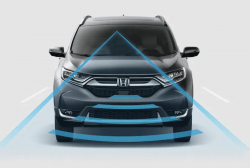— A Honda CR-V Sensing lawsuit alleges the safety systems are defective in 2016-2019 Honda CR-V, CR-V EX, CR-V EX-L and CR-V Touring SUVs.
The class action lawsuit says the Sensing systems use radar sensors, cameras and computers to help drivers avoid collisions by automatically applying the brakes to avoid objects in the road.
Honda Sensing includes technology to allegedly help protect occupants, including collision mitigation braking, road departure mitigation, adaptive cruise control with low-speed follow, lane keeping assist and cross traffic monitor.
However, the Honda lawsuit alleges the Sensing systems don't protect occupants but cause unnecessary dangers due to defects.
According to the plaintiff, the CR-Vs suffer from false positives that cause the vehicles to suddenly brake without warning even though no objects are in the path of the SUVs.
The vehicles also allegedly activate numerous warning messages about hazards that don't exist, and drivers are told the quickly apply the brakes when there are no reasons to do it.
Illinois plaintiff Phylistene Ward leased a 2019 Honda CR-V EX but had to take the SUV to the dealership which in July 2019 described her complaint: “Alarm sounds off when driving after 10-15 min - vsa - brake Monitoring - a list showed up on dash - has happened 3 times in last week.”
The plaintiff says the dealer had no fix for the problem other than clearing the trouble codes and doing a test drive which didn't replicate the problem.
Days later the problem returned and the dealer replaced the milliwave radar and radar unit and cleared the error codes. However, the plaintiff says she had to take the CR-V to the dealership in August after the vehicle activated multiple safety warnings about the system.
Technicians allegedly couldn't replicate the problem, so nothing was done other than clearing the trouble codes.
Days later the problem allegedly returned, so the plaintiff made another visit to the dealer, but that only caused another trip to the dealership. The fifth visit showed trouble codes that related to a misaligned wave sensor and dirty wave sensor.
The dealership cleaned the radar unit and returned the CR-V to the plaintiff, but she says the vehicle still has problems with the Sensing system.
According to the class action lawsuit, Honda said in April 2018 it was investigating consumer complaints about the Sensing systems, telling dealerships:
“American Honda Motor Co., Inc. (AHM) is investigating certain 2017-2018 CR-Vs with a customer complaint of various warning lights such as the brake system, lane departure, ACC & forward collision warning illuminated on the dash with the DTC P2583-76 (Temporary stop of Integrated Driver System ? Misalignment Millimeter Wave Radar) stored.”
Honda has allegedly failed to create a real repair for the problem other than telling dealerships to clear trouble codes that indicate defects in the systems. The plaintiff claims the automaker continues to conceal the defects from both current and potential customers, all allegedly to continue making money from vehicles too dangerous to drive.
The Honda CR-V Sensing class action lawsuit was filed in the U.S. District Court for the Central District of California: Ward, et al., vs. American Honda Motor Co., Inc., et al.
The plaintiff is represented by Alexander Krakow + Glick, and Greenwald Davidson Radbil.
CarComplaints.com has complaints about Honda CR-Vs and other Honda models.

